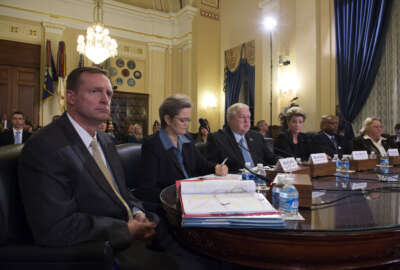
Court rules key VA SES firing and appeals authority unconstitutional
The U.S. Court of Appeals for the Federal Circuit upheld an appeal from Sharon Helman, the former director of the beleaguered Veterans Affairs medical center in...
The U.S. Court of Appeals for the Federal Circuit ruled Tuesday that a controversial provision in the Veterans Access, Choice and Accountability Act — which ultimately renders an administrative judge’s decision final in a senior executive’s disciplinary appeal before the Merit Systems Protection Board — is unconstitutional.
The court upheld a petition from Sharon Helman, the former director of the Veterans Affairs Department’s Phoenix, Arizona, medical center. With the court’s ruling, the Merit Systems Protection Board will review Helman’s petition and the administrative judge’s original decision to uphold VA’s removal. The removal remains in place for now.
MSPB, however, currently lacks a quorum and cannot review those decisions until President Donald Trump appoints at least one other board member. Mark Robbins serves as the vice chairman and lone MSPB board member.
Helman was fired in 2014 soon after Congress passed the VA Choice Act. She appealed her removal to MSPB, which referred her case to an MSPB administrative judge as the Choice Act requires. The judge sustained two of the three charges against her and upheld her firing.
Helman at the time attempted to appeal the ruling to the two-member, politically-appointed board at MSPB, but the 2014 law dictates that the judge’s decision is final in these cases.
She then sent a petition to the U.S. Court of Appeals for the Federal Circuit, arguing that the section in VA Choice Act that confirmed her removal violated the Appointments Clause in the Constitution.
Now, the latest decision from the Court of Appeals is once again fueling VA’s push for new accountability legislation from Congress.
“Today’s ruling underscores yet again the need for swift congressional action to afford the secretary’s effective and defensible authority to take timely and meaningful action against VA employees whose conduct or performance undermines veterans’ trust in VA care or services,” VA Secretary David Shulkin said in a statement.
Shulkin once again urged Congress to pass new legislation that would give him new authorities to more quickly fire or discipline both senior executives and rank-and-file employees for poor performance or misconduct.
The House already passed a bill, the VA Accountability First Act, which addresses some of the department’s challenges. In unveiling a new accountability and whistleblower protection office for the department last month, Shulkin and Trump have urged the Senate to take up and quickly pass the bill.
Leadership on the Senate VA Committee said members were working on legislation.
“Sen. [Jon] Tester (D-Mont.) and I are dedicated to working with our colleagues in the Senate and House as well as with the administration on bipartisan legislation that will allow the VA to adequately hold employees accountable for wrongdoing and withstand legal scrutiny,” Sen. Johnny Isakson (R-Ga.), the committee’s chairman, said in a statement.
A spokesperson for Isakson said April 27 that the committee is working on “bipartisan accountability legislation and … hope[s] to be ready to introduce that very soon.”
VA said last summer that it would no longer use the authority it had under the 2014 law to more quickly remove senior executives in response to former Attorney General Loretta Lynch, who said she wouldn’t defend against Helman’s challenge.
The notion that a federal employee — a MSPB administrative judge in this case — holds the final opinion on a senior executive’s future and could overrule a decision from a presidentially-appointed secretary makes little sense, she said in May 2016 letter to Senate Legal Counsel.
Without the 2014 authority, VA must use the standard rules under Title 5 that apply for removing civil employees.
Copyright © 2024 Federal News Network. All rights reserved. This website is not intended for users located within the European Economic Area.
Nicole Ogrysko is a reporter for Federal News Network focusing on the federal workforce and federal pay and benefits.
Follow @nogryskoWFED
Related Stories

DoJ says key VA Choice provision for SES appeals is unconstitutional





